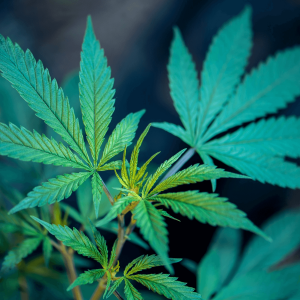THCa is all the talk recently, especially as stoners in illegal states are discovering online (and legal!) hemp delivery. However, A common question among those very stoners is: “How long does THCa stay in your system?”
THCa, or Tetrahydrocannabinolic acid, is naturally present in fresh cannabis plants and converts to THC when heated through a process called decarboxylation. Now, the duration that THCa remains detectable in the body can vary based on several factors like how often it’s consumed and individual metabolism… among others.
In this blog, we’ll explore the science behind how long THCa stays in your system, the “other” factors we mentioned, and even a few methods that may influence its detectability in drug tests.
Let’s begin!
THC vs. THCa
Just to keep you in the loop, we’re going to dive into the world of drug test detection windows and the factors that influence them, but first, we must clear up the common confusion between THC and THCa.
While they may sound similar, they’re actually quite different in terms of their chemical structure and effects. THC, or delta-9-tetrahydrocannabinol, is the main compound in cannabis responsible for the ‘high.’ On the other hand, THCa is a non-psychoactive compound found in raw cannabis.
It’s only when THCa is heated, whether through lighting up, baking, or vaping, that it transforms into THC through a process called decarboxylation. Understanding this difference is important because it affects your experience, how long these substances stay in your body, and their detectability in a drug test.
THCa in the Body
Once THCa is decarboxylated into THC and enters the body, typically through inhalation or ingestion, it gets to work immediately.
The (newly formed) THC quickly spreads through the bloodstream and travels throughout the body, with a particular affinity for fatty tissues and organs. These become storage sites from which THC is gradually released back into the bloodstream. That said, the effects of THC, derived from THCa, can linger and remain detectable for an extended period.
Now, the liver metabolizes THC into molecules called metabolites, which are commonly identified in drug tests. These metabolites have a longer detection window in the body compared to THC itself.
As you can see, understanding this process is important, especially for those concerned about drug testing or the duration of effects. But, don’t stress, we’ll touch more on this topic a bit later.

How Long Does THCa Stay in Your System? – Key Factors That Affect THCa Breakdown
When discussing how long THCa lingers in the body (and appears on your next drug test), three pivotal aspects come into play:
- Age
- Metabolism
- Frequency of use
To start, age plays a significant role because our metabolic rates tend to slow down as we get older. It’s actually pretty common for everyone to experience this. It just means that it might take a bit longer for older individuals to process and get rid of substances like THCa from their system.
Another important factor is metabolism. People with faster metabolic rates will process and expel THCa more quickly compared to those with slower rates.
Lastly, the frequency of use is equally important. Regular consumption can result in the accumulation of THCa in the body, which in turn extends the time it takes to completely eliminate the substance and guarantee a negative drug test.
Understanding these factors provides valuable insight into why THCa detection times via drug test can vary greatly from person to person.
The Role of Metabolism in THCa Absorption: How Fast Your Body Processes THCa Metabolites
As mentioned, metabolism plays a key role in how quickly THCa is absorbed and processed in the body. But because it plays such an important role, we figured it needed a special spotlight.
This biological process, which varies from person to person, determines how fast your body converts food into energy.
When it comes to THCa, a faster metabolism means a quicker conversion of THCa into THC and a more rapid breakdown of substances in the body. This high metabolic rate speeds up the detoxification process, resulting in a shorter detection window for THCa.
On the other hand, those with a slower metabolism may find THCa lingering in their system for a longer period. And of course, this affects how long it remains detectable.
Individual metabolic rates are influenced by factors like genetics, age, activity level, and overall health, making the absorption rate of THCa a highly personalized aspect of its impact on the body.
THCa and Drug Testing: What You Should Know
We told you we’d return to this topic!
When it comes to drug testing, there’s a lot of curiosity about how THCa might show up in different screenings. Keep in mind that each type of drug test – urine tests, blood tests, hair tests, or saliva tests – has its own sensitivity and timeframe for detecting cannabis compounds.
Urine tests, which are the most common, can detect THC metabolites for days to weeks after use, depending on how often and how much was consumed.
Blood tests have a shorter detection window, usually picking up THC metabolites for only a few hours to a couple of days after use.
Hair tests are more sensitive and can trace cannabis use back up to 90 days, while saliva tests tend to have the shortest detection window, generally from a few hours up to a day after consuming THCa.
It’s important to understand that since THCa converts to THC, it’s the THC metabolites that are measured during drug screenings. The tests’ sensitivity to detect THCa specifically is less clear, as it quickly converts to THC, but it’s important for smokers to be aware of the potential for positive drug test results.

Short-Term Stay: THCa’s Immediate Presence
Immediately following consumption, the presence of THCa in the body is fleeting—in its original form, that is.
But here’s the thing: when it’s exposed to heat, it quickly transforms into THC, which is what most drug tests focus on. So, if you were to get tested right after using, those traditional tests might not pick up on THCa itself because it converts into THC pretty fast.
However, the resulting THC and its metabolites can show up in your bloodstream within minutes, which means they could be detected by certain types of drug tests, like blood screenings.
Ultimately, how long THCa stays in your system depends on the sensitivity of the test and how you consume it. It could range from a few hours to several days, so it’s important to keep that in mind.
The Long Haul: THCa in Frequent Users
Frequent cannabis users (aka stoners) have a special relationship with THCa, and this affects both its accumulation and long-term detection.
Regular use leads to a gradual build-up of cannabinoids in the body, especially in fat cells. As a result, the presence of THCa and THC can persist for extended periods. This longer detection window in drug tests means that THC metabolites are released steadily, making them detectable for weeks or even months after stopping use.
It’s important for frequent users to understand how their usage impacts not only the immediate effects but also the long-term presence of cannabis compounds in their bodies. So, even after quitting, these compounds can stick around for a while.
One-Time vs. Regular Use: A Comparative Look at Drug Test Detection Times Based on Usage Patterns
As we’ve established, frequency of use plays a major role in how long THCa stays in your system. But let’s break it down even further and compare drug test detection times based on different usage patterns.
- One-time users: THCa might only be detectable for 1-2 days after consumption.
- Occasional users: The detection window could range from weeks to months after consumption.
Clearly, when it comes to detecting cannabis, there’s quite a difference between one-time users and regular users. If you try cannabis just once, THCa and its THC metabolites usually leave your system pretty quickly, typically within a few days. This is because these compounds don’t build up in your body, so they can be eliminated faster.
On the other hand, regular users might find that these substances stick around for much longer. The body gets used to the cannabinoids and stores them in fat cells, which means they can be detected for weeks or even months.

The Impact of Exercise on THCa Elimination: How Physical Activity Can Influence Detection Times
You may (or may not) want to hear this… but, it’s true: Exercise could help to eliminate THC metabolites from the body.
When it comes to getting rid of THCa, regular physical activity can make a real difference. Exercise, especially cardio and high-intensity workouts, revs up your metabolism and helps flush out THCa and its THC metabolites faster.
Plus, burning fat through activities can release stored cannabinoids into your bloodstream, which can then be processed and eliminated.
Just keep in mind that right after exercise, THC might be more detectable. So, if you’re going through drug testing, you have good reason to skip that 6am workout.
How Long Does THCa Stay in Your System? – Diet’s Role in Metabolizing THCa
Did you know that what you eat can actually affect how your body metabolizes THCa? Some foods can even impact how long cannabis compounds stay in your system.
For example, a diet high in fiber can help speed up the elimination of THCa by regulating your digestive system. On the other hand, fatty foods can cause cannabinoids to stick around in your body by binding to fat cells.
Foods like green tea and chili peppers can actually boost your metabolism and help process cannabis compounds more quickly.
So, keep these tips in mind next time you visit the grocery store!
Hydration and THCa: Is Water the Answer?
So, there’s a pretty common myth going around about “flushing out” THCa by chugging lots of water. Well, turns out it’s not that simple.
While staying hydrated is generally good for your health, it doesn’t really speed up the elimination of cannabis compounds. Drinking water might temporarily dilute your urine and lower the concentration of THC metabolites, but modern urine drug tests are smart enough to catch onto that trick.
In fact, excessive water intake can even lead to health issues and raise suspicion during testing, hinting at an attempt to cheat the system.
So, bottom line, while it’s important to stay hydrated, relying solely on that to pass a drug test is more of a myth than a practical solution.

High BMI and THCa
The connection between body weight and the retention of cannabis compounds like THCa shouldn’t be overlooked.
When it comes to individuals with a higher body mass index (BMI), they tend to have more fat tissue, which acts as a reservoir for cannabinoids. This means that people with a higher BMI may retain THCa and THC in their systems for a longer period.
Essentially, fat cells can absorb and slowly release these substances over time. Interestingly, losing weight can actually result in the release of stored cannabinoids into the bloodstream, which may impact drug test results even after periods of abstention.
Needless to say, body composition plays a crucial role in the duration of cannabis compounds in the body. We know, life just isn’t fair sometimes.
Gender Differences in THCa Metabolism
So, there are some interesting studies suggesting that gender might have an impact on how our bodies process THCa. This could potentially affect how long these compounds stay detectable.
Generally, guys tend to have a faster metabolism and more muscle mass, which could mean they process and eliminate cannabinoids quicker.
Hormonal differences also come into play. For example, estrogen can influence how our bodies respond to cannabis.
On the other hand, women, who naturally have more body fat, might hold onto cannabinoids like THCa for a bit longer due to their fat storage capacity.
It’s a complex topic, and research is still ongoing, but it’s clear that gender can be a factor in how long THCa sticks around in our system.
Genetics and THCa: A Look into If and How Genetics Play a Role
When it comes to how long THCa stays in the body, genetics may also have a significant role to play.
Apart from lifestyle and physiological differences, genetic variations can equip some people with faster metabolisms, leading to a quicker breakdown and elimination of substances like THCa.
Plus, the efficiency of certain enzymes responsible for metabolizing cannabinoids can vary among individuals due to their genetic makeup.
Additionally, genetic factors can influence how the body stores fat and, consequently, how long it retains fat-soluble substances such as cannabinoids.
Although research in this area is still in its early stages, initial studies suggest a genotypic influence on the pharmacokinetics of cannabis, indicating a complex interplay between our genes and how we process compounds from this plant.
Prescription Meds and THCa: An Unexpected Interaction?
It’s pretty well known that prescription medications can have all sorts of effects on the body. But one area that’s starting to get more attention is how these meds might affect the detection times of THCa.
Some meds could slow down the body’s breakdown of cannabinoids, which could mean they stick around for longer. On the flip side, there are drugs that can speed up this process. And let’s not forget about the impact that certain medications can have on kidney function and how that might affect drug test results.
While we’re still waiting on solid evidence, it’s definitely something to keep in mind, especially if you’re someone who gets tested a lot.

Stress and Hormones: An Invisible Influence on THCa?
The way stress hormones, like cortisol, interact with the metabolism of THCa might be more significant than we care to acknowledge.
When we’re stressed, our bodies produce cortisol, which not only affects our mood but also how we process substances like cannabinoids. For instance, high cortisol levels could change how quickly the body breaks down and eliminates THCa, meaning that during times of stress, individuals might experience different rates of cannabinoid metabolism.
It’s not just cortisol, though; other stress-triggered hormones can indirectly impact bodily functions, potentially influencing how long THCa can be detected in the system.
While the details are intricate and ongoing research continues to uncover these nuances, the interplay between stress hormones and cannabinoid retention adds another layer to our understanding of drug metabolism in humans.
Lifestyle Choices That Affect THCa Longevity
Daily habits can have a big impact on the presence of THCa in your body and how long it can be detected through standard drug tests. Things like regular exercise can speed up your metabolism and potentially reduce how long cannabinoids stay in your fat cells.
Your diet also plays a role – a high-fiber diet can help substances move through your digestive system more quickly. And don’t forget about sleep! Getting enough rest is important for your metabolism and how your body processes THCa.
On the flip side, drinking alcohol frequently can slow down your liver function and make it harder for your body to metabolize cannabinoids, which could make them detectable for longer.
So while there’s no guaranteed way to beat a drug test (sorry!), your lifestyle choices definitely affect how your body handles cannabis compounds, and knowing this could help you to stay proactive.
Comparing Consumption Methods: Does It Matter?
The way people consume cannabis can have a big impact on how THCa is absorbed, broken down, and stored in the body.
Here are a few important differences to keep in mind:
- Smoking/Vaping: Typically, THCa transforms into THC rapidly through heating, and the effects are almost immediate. However, since it enters the bloodstream quickly through the lungs, its detectable window is shorter compared to other methods.
- Edibles: When ingested, THCa undergoes a different process, being metabolized by the liver into a more potent form known as 11-hydroxy-THC. This process is slower, leading to a delayed onset of effects and a prolonged retention time in the body.
- Tinctures: Sublingual absorption of cannabis tinctures can result in a quicker onset of effects than edibles, with a shorter detectable period than ingested forms but potentially longer than inhalation methods.
- Topicals: As they are absorbed through the skin and typically do not reach the bloodstream, topicals are less likely to be psychoactive and are often not considered in standard drug tests for cannabis use.
Does Second-Hand Smoke Count?
Many individuals have concerns about second-hand smoke and how it may affect drug test results.
While research is ongoing, current evidence suggests that, in extreme cases of non-ventilated exposure, there’s a slim chance that second-hand smoke could have a minimal influence on test results. However, typical passive exposure is unlikely to result in significant levels of cannabinoids in the body.
With that being said, non-users can rest assured that being casually near cannabis smoke in a well-ventilated area is unlikely to cause intoxication or a positive drug screening. Even sensitive tests can’t detect THC metabolites that well.

Detoxing from THCa: Myths vs. Reality
When it comes to detoxing from THCa, it’s important to separate fact from fiction. There’s a ton of advice out there, like drinking excessive amounts of water or herbal teas, that claim to be quick solutions. However, scientific support for these methods is lacking.
The same goes for detox kits and supplements that make bold claims without much evidence to back them up. The truth is, our bodies have a natural detoxification system composed of the liver, kidneys, and digestive tract, which work tirelessly to eliminate toxins, including cannabinoids.
While maintaining a healthy lifestyle with good hydration, balanced nutrition, and regular exercise can support this natural process, it’s important to be realistic about any quick-fix detox methods. Unfortunately, most of them are more myth than reality and don’t seem to effectively flush THC metabolites from the body.
The Truth About Cleansing Teas and THCa: Do They Actually Help or Just a Fad?
Cleansing teas are often advertised as a way to quickly eliminate detectable THC metabolites from the body, but it’s important to note that the scientific evidence supporting their effectiveness is lacking.
While these teas may increase hydration and support kidney function, they don’t necessarily speed up the metabolism of cannabinoids.
It’s important for consumers to be skeptical of claims of rapid detoxification and understand that the body’s natural processes and time are the most reliable factors in clearing substances like THCa. So, while these teas may have some benefits, it’s best to rely on the body’s own mechanisms for detoxification.
Can Supplements Alter THCa Retention?
The supplement market is flooded with products that claim to affect the body’s retention of THCa, targeting those who need to pass drug tests. However, scientific scrutiny often debunks these claims as myths rather than credible solutions.
Herbal supplements primarily exist to complement the diet and should not be mistaken for magic potions that can speed up the elimination of cannabinoids. Our liver and kidneys are naturally equipped to detoxify the body, so any supplement promising to enhance this process should be met with skepticism.
To make an informed decision about supplements that claim to affect THCa retention, consumers should look for transparency in ingredient efficacy, clinical trials, and regulatory approval.
Conclusion
When it comes to understanding how long THCa stays in your body, we’ve explored various factors like lifestyle choices, consumption methods, and detox myths.
The overall evidence suggests that regular exercise, a balanced and healthy diet, and good sleep patterns can help speed up your metabolism, potentially reducing the time cannabinoids stay in your system. On the other hand, lifestyle factors like alcohol consumption can have the opposite effect.
How you consume THCa, whether through smoking, edibles, or other methods, greatly affects how it is absorbed and processed, ultimately determining how long it remains detectable in your body.
As for detox myths – such as second-hand smoke exposure, cleansing teas, or unverified supplements – it’s important to rely on our body’s natural detoxification mechanisms rather than quick fixes.
Frequently Asked Questions
1. Does THCa Show Up on a Drug Test?
While THCa is not the psychoactive compound that most drug tests are screening for, it can be converted to THC when decarboxylated, or heated.
Therefore, if THCa is present in a sample and undergoes conversion during testing, it may result in positive test results.
However, the likelihood and specifics would depend on the sensitivity and type of the test being used to detect the cannabis metabolites.
2. How Does THCa Affect the Body?
THCa, the acidic precursor to THC, has its own set of potential effects on the body.
Although it doesn’t produce the psychoactive effects that THC does, some research suggests that THCa may have anti-inflammatory, neuroprotective, and anti-emetic properties, making it of interest for therapeutic usage.
3. How Far Back Does a 10 Panel Urine Test Go?
A 10 panel urine drug test typically detects substances used within the past week, or even longer for regular users.
For cannabinoids like THCa/THC, the detection window may be up to 30 days or more for heavy users due to fat solubility, which allows these compounds to remain in the body for extended periods.
4. Is THCa a Controlled Substance?
No. Under federal laws in the United States, THCa is not a Schedule I controlled substance because it is not psychoactive THC.
5. How long does THCa stay in your system?
The length of time THCa stays in your system varies greatly depending on several factors, including frequency of use, body metabolism, and individual body fat percentage.
For infrequent users, THCa may only be detectable for a few days after use. Meanwhile, regular users may find that THCa can remain in their systems for several weeks or even longer.
Since THCa is fat-soluble, it can be stored in body fat cells and released slowly over time, which can extend the duration it is detectable in the body.
As a rough guideline, THCa could stay in the system of an infrequent user for up to 3 days, while for a heavy user, it may be detectable for 30 days or more after the last use. However, these are only estimates and can differ significantly between individuals.

 Rewards
Rewards




